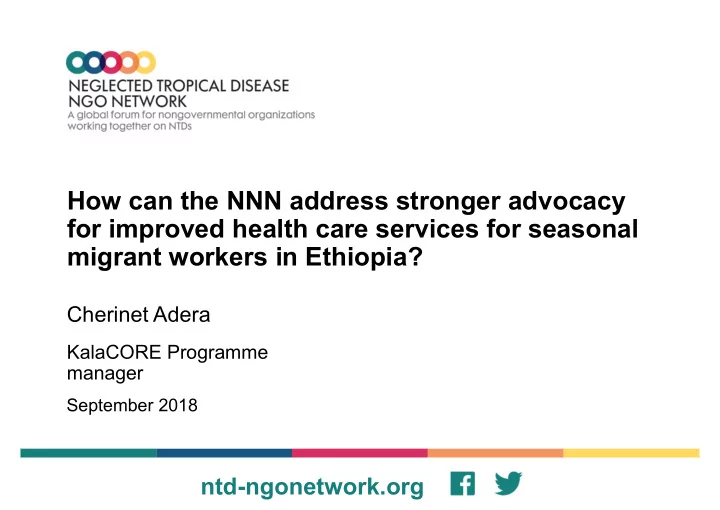

How can the NNN address stronger advocacy for improved health care services for seasonal migrant workers in Ethiopia? Cherinet Adera KalaCORE Programme manager September 2018 ntd-ngonetwork.org
How can the NNN address stronger advocacy for improved health care services for seasonal migrant workers in Ethiopia? ntd-ngonetwork.org
Seasonal Migrant Workers: Under-prioritized and Under- protected • During June-November weeding and harvesting seasons, Metema and Humera lowland regions of Amhara and Tigray attract 300,000 - 500,000 seasonal migrant workers annually • High risk of infection for diseases including Visceral Leishmaniasis (VL), Lymphatic Filariasis (LF), malaria, TB, HIV as well as acquiring snakebites • Risk of seasonal migrants taking infections (leishmaniasis) back to their communities in the surrounding highlands, increasing the risk of outbreaks and with serious implications for the NTD elimination agenda • Example: Addis Zemen ntd-ngonetwork.org
Example – Eastern Africa leishmaniasis burden • The Horn of Africa (Sudan, S. Sudan, Ethiopia, Kenya, Uganda and Somalia) harbors about 40% of the global VL burden (WHO: 9602 reported cases in 2015, underreporting rate 1.2–1.8) • The annual burden of VL in Ethiopia is between 2000- 4500 cases • 1465 VL patients were treated in 2017 905(61.8%) in Amhara region 368 (27.2%) in Tigray region ntd-ngonetwork.org
Challenges: Working and Living Conditions • Migrant workers lead a difficult life when working on a farm: • Sleeping outside without bednets open to the environmental elements • Malnutrition is common among migrant farm workers • Intensive working hours including during the night • Poor access to safe water for drinking, cooking and personal hygiene • Poor access to treatment and diagnosis services and health messaging on NTDs , e.g. for visceral leishamaniasis (VL) 61.8% of seasonal migrant workers had poor knowledge of on VL transmission and sandfly control •Legislation in place on migrant workers’ rights to health care, shelter, clean water etc while working on a farm, however in reality most are not able to access these rights. ntd-ngonetwork.org
Recommendations – Collaborative and Targeted Advocacy by NTD Community • Inter-sectoral approach to develop appropriate, targeted interventions to meet the needs of this vulnerable group • Share research results and lessons learnt to develop strategies aligning NTD cross-sectorial stakeholders to develop advocacy tools to improve application of the labour laws for migrant workers access to health services, shelter and clean water; and to advocate for equitable work contracts . ntd-ngonetwork.org
When spiderwebs unite, together they can tie up a lion - Ethiopian proverb ntd-ngonetwork.org
With thanks to our national host and generous sponsors… ILEP Members: ntd-ngonetwork.org
Recommend
More recommend